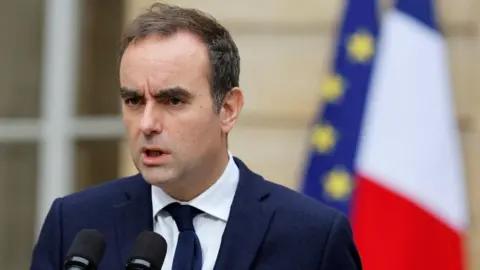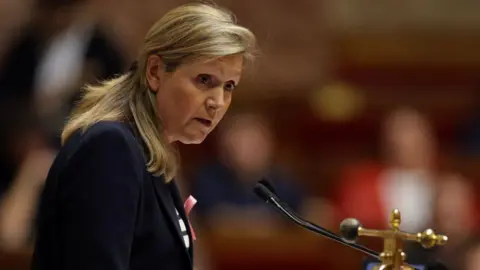Paul KirbyEurope digital editor
 Reuters
ReutersHours before his deadline for resolving France’s political crisis, outgoing Prime Minister Sébastien Lecornu said political parties have shown a “willingness” that could stave off the threat of new parliamentary elections.
Lecornu on Monday became the third French PM to leave his job in less than a year. He has until Wednesday evening to come up with a plan for the “stability of the country” and has held talks with several political parties.
Like his predecessors, Lecornu was unable to push through a budget to bring down the government’s deficit and tackle public debt.
Ahead of a second day of talks, Lecornu said he had detected a “willingness to have a budget for France before 31 December”.
“And this willingness creates movement and convergence, obviously, which makes the prospect of dissolution [of parliament] more remote,” he said in a statement in the courtyard of his Paris residence at the Hôtel Matignon.
The outgoing prime minister then began talks with Socialist leaders. He is due to go on French TV at 20:00 local time (18:00 GMT) to give details of whether he had found a solution.
His best hope appears to be some kind of political pact to prevent any new government being thrown out in a confidence vote.
Commentators and officials said Lecornu’s TV appearance meant it was unlikely President Emmanuel Macron would himself give an address.
Lecornu’s shock resignation on Monday left France in renewed political turmoil, 18 months before the end of Macron’s second term in office. Macron’s decision to call snap elections in mid-2024 left France with a hung parliament and a succession of minority governments.
Lecornu was in the job for only 26 days before his government fell apart, triggered by criticism from the leader of the conservative Republicans, Bruno Retailleau.
Macron then gave the outgoing prime minister 48 hours to find a way out of the crisis.
After talks with Lecornu on Wednesday, Socialist leader Olivier Faure appeared to rule out any chance of his centre-left party joining the next government.
“The budget plan, the way it was presented today, is a budget plan that we cannot be part of… and a joint government with Macron’s [allies] is unimaginable,” he told reporters.
That does not mean the Socialists would try to bring down a new government, which the hard-right National Rally of Marine Le Pen and radical left would be likely to try. Le Pen, whose party leads in the polls, has called on Macron to “seriously consider” dissolving parliament and holding new parliamentary elections.
Overnight there were suggestions that Lecornu could secure centre-left support if the government suspended highly contested pension reforms that raised the retirement age from 62 to 64. However, outgoing Finance Minister Roland Lescure warned that would cost France hundreds of millions of euros this year, and billions more in 2026, when the country is trying to cut its budget deficit.
France’s public debt earlier this year was almost 114% of economic output (GDP), and this year’s budget deficit is projected to hit 5.4% of GDP.
Without Socialist involvement in the next government, Lecornu’s best hope is to cobble together a revitalised centrist cabinet with the Republicans – known as the socle commun – or common platform.
The Republicans have so far made clear they will not join a left-led government, but their return to government with the Macronists is not definite either.
National Assembly President Yaël Braun-Pivet, who met Macron on Tuesday, told French radio they had not discussed dissolving parliament and she did not see it as a good idea: “Above all it wouldn’t resolve a great deal.”
Braun-Privet later warned that if a budget deal was not agreed in the coming days, France would face “very serious consequences”.
 THOMAS SAMSON/AFP
THOMAS SAMSON/AFPLecornu said in his statement that reducing France’s budget deficit below 5% of national economic output (GDP) was crucial, and that based on his conversations so far there was a willingness to have a budget by the end of the year.
“Reducing our [budget] deficit is key, including for the credibility of France’s signature abroad, and quite simply our ability to borrow, and therefore the impact also on interest rates. That’s true for the state but it’s also especially true for households and businesses,” he added.
But as well as insisting on the need to bring down the deficit, he said the new government would need to agree on the future of France’s South Pacific territory of New Caledonia.
His planned 2026 budget was due to include vital financial aid to the territory after heavy damage caused by riots last year.
The French government has stopped short of granting New Caledonia full independence but has offered greater autonomy, in a deal yet to be approved in a vote. Lecornu’s resignation on Monday halted the planned timetable for a referendum followed by provincial elections next year.



